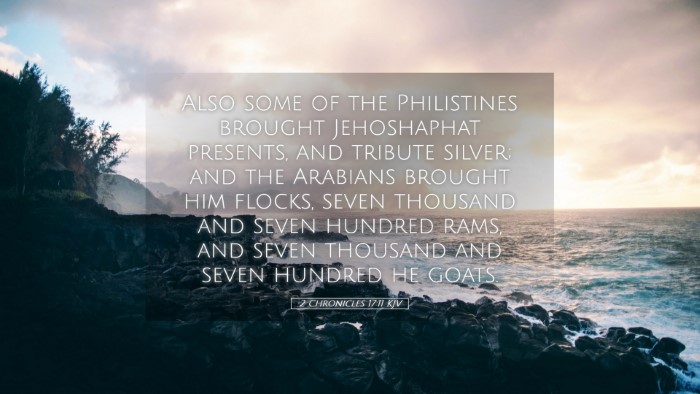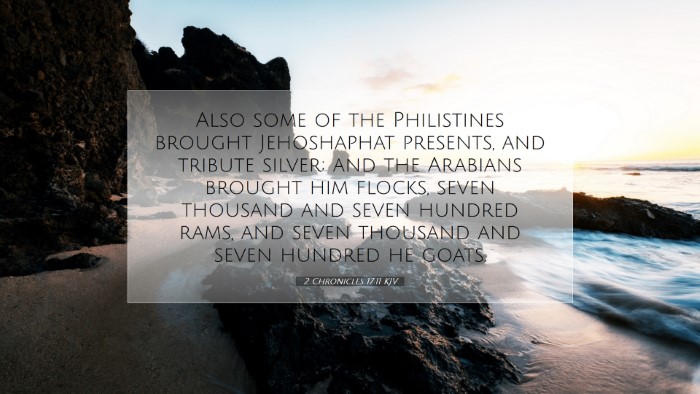Commentary on 2 Chronicles 17:11
2 Chronicles 17:11 states:
"And some of the Philistines brought Jehoshaphat presents, and tribute silver; and the Arabians brought him flocks; seven thousand and seven hundred rams and seven thousand and seven hundred he goats."
Introduction
This verse highlights the reign of King Jehoshaphat, emphasizing the peace and prosperity he experienced. Jehoshaphat's rule is characterized by strategic military alliances, economic stability, and a desire to follow the ways of the Lord. This commentary will explore the theological and historical implications of this verse, drawing insights from public domain commentaries.
The Context of Jehoshaphat's Reign
Jehoshaphat, the son of Asa, is noted for his reforms towards the worship of Yahweh and his attempts to align the kingdom of Judah with God’s will. His reign is marked by a notable shift from conflict to a more diplomatic approach with neighboring nations. The events leading to the tribute from the Philistines and Arabians are significant as they reflect the strength and influence of Judah under his leadership.
Public Domain Commentary Insights
-
Matthew Henry:
Henry emphasizes that Jehoshaphat’s religious reforms led to national stability. By prioritizing worship and adherence to the covenant, the Lord blessed Jehoshaphat’s efforts, manifesting in peace with surrounding nations. The tribute from the Philistines and the Arabian flocks is indicative of a prosperous reign, as enemies were subdued and turned into tributaries, acknowledging the supremacy of Judah.
-
Albert Barnes:
Barnes notes that the tribute signifies a formal acknowledgment of Jehoshaphat's position. It is emblematic of the respect that nations had for Judah due to the reputation Jehoshaphat built through his wise governance. He also connects the material blessings to the spiritual climate in Judah, aligning with biblical principles that suggest obedience leads to prosperity.
-
Adam Clarke:
Clarke elaborates on the significance of the numbers presented: "seven thousand and seven hundred rams and he goats." He posits that the precision of these numbers symbolizes completeness and the favor of God upon Jehoshaphat’s reign. The offerings brought demonstrate not only wealth but also the recognition of God’s sovereignty over even the most resistant opponents, like the Philistines.
The Significance of Tribute and Peace
The tribute of the Philistines and Arabians signifies the transition of former hostilities into economic alliance. This verse captures a moment where former foes acknowledge the strength of Jehoshaphat's leadership and the prosperity that comes from fearing the Lord.
-
Theological Implications:
This tribute serves as a testament to the fulfillment of God's promise to bless those who honor Him. Jehoshaphat's actions paved the way for peace and prosperity, demonstrating that following God's ways can lead to national wellness and stability.
-
Historical Perspective:
Historically, the tribute can also be seen as a political move to secure peace with neighboring nations, a common practice in ancient monarchies. Jehoshaphat’s reign marked a unique period of tranquillity in Israel’s contentious history, emphasizing the successes of a king who sought divine guidance.
Lessons for Today’s Leaders
For contemporary pastors, students, and theologians, Jehoshaphat’s reign offers valuable insights into the principles of effective leadership. His commitment to God should inspire modern leaders to cultivate a morally and spiritually grounded approach to governance.
-
Loyalty and Reform:
Leaders must prioritize loyalty to God and be willing to implement necessary reforms that align with divine principles. Jehoshaphat’s reforms not only enhanced Israel's national identity but also attracted the goodwill of other nations.
-
Building Alliances:
Leaders should understand the importance of building alliances grounded in mutual respect and shared values. The tribute from the Philistines illustrates that peace is often a more effective path than conflict, especially when rooted in a community's shared faith.
-
Commitment to Worship:
Emphasizing worship and faith among the people can foster a collective identity that strengthens a community. Jehoshaphat's dedication to leading his people in worship yielded tangible blessings, an example for current church leaders.
Conclusion
2 Chronicles 17:11 provides a snapshot of a pivotal moment in Jewish history during the reign of Jehoshaphat. The tribute received from the Philistines and Arabians serves as a powerful reminder of the blessings that come from aligning one’s actions with God’s will. Through faithful leadership, religious fidelity, and diplomatic engagement, Jehoshaphat exemplifies the substantial impact of a leader who seeks divine guidance. As modern-day leaders reflect upon his example, may they be inspired to foster a spirit of peace and obedience to God, leading to blessing upon their communities.


